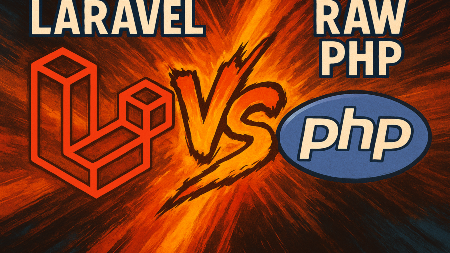

Choosing between Laravel and raw PHP can be a make-or-break decision for developers and businesses alike. Whether you're building a small side project, launching a startup MVP, or architecting a complex enterprise system, the tools you use will impact development speed, code maintainability, and scalability.
In this article, we’ll break down the pros and cons of Laravel vs. raw PHP, and help you decide when each is the right fit.
🔍 What Is Raw PHP?
Raw PHP refers to writing PHP code without using any framework. It means you're directly handling:
- Routing
- Database connections
- Sessions
- Authentication
- and everything else… manually.
It gives you complete control, but also places all the responsibility for structure, security, and performance in your hands.
🚀 What Is Laravel?
Laravel is a modern, open-source PHP framework that provides a robust set of tools for building web applications efficiently. With features like:
- Blade templating
- Eloquent ORM
- Middleware
- Queues & jobs
- Artisan CLI
- Built-in routing, authentication, and more
Laravel is designed to help developers move fast and stay organized.
✅ When to Use Laravel
Laravel shines in the following scenarios:
1. You’re Building a Full-Fledged Web App
Laravel’s MVC architecture, routing system, and templating engine make it perfect for building apps like:
- SaaS products
- Admin dashboards
- Social platforms
- Marketplaces
2. You Need to Move Fast
Laravel comes packed with pre-built solutions (like auth scaffolding, migrations, and form validation) that save you tons of development time.
3. You Want Built-In Security
Laravel handles CSRF, SQL injection protection, and XSS prevention out of the box.
4. You’re Working with a Team
Laravel promotes code structure and readability. Its conventions help teams stay on the same page.
5. You Need Scalable Architecture
With Laravel Octane, queues, and service container support, Laravel scales well when properly optimized.
✅ When to Use Raw PHP
Raw PHP isn’t dead — and in some cases, it’s a smart choice:
1. You’re Building Something Very Simple
For tiny scripts, quick prototypes, or simple websites, Laravel may be overkill. A few files of raw PHP can be all you need.
2. You Want Full Control
Frameworks come with conventions. If you prefer to build your own architecture or have ultra-specific needs, raw PHP gives you freedom.
3. You’re Working with Legacy Systems
Many older applications are built in raw PHP, and maintaining or expanding them sometimes requires sticking with the original stack.
4. Server Resources Are Limited
Laravel has more overhead than plain PHP. On shared hosting or minimal environments, raw PHP might perform better.
⚖️ Laravel vs. Raw PHP: Quick Comparison
Laravel is heavy on the load so a raw PHP version is much better when it comes to speed.
- Usually database is the one that slows a PHP web app so a caching system would solve that
Illuminate/Database really easy to query your database, you can use it in your project without having to use the full framework.
RAW PHP you'll have to use PDO so you can easily switch between databases so you're not stuck on MySQL for example.
For beginers it's really easy to make mistakes and add SQL injections in your code if you're using RAW queries with variables that are not sanitized.
🧠 Final Thoughts: Which One Should You Choose?
There’s no one-size-fits-all answer.
- Use Laravel if you want to build scalable, maintainable, and modern web applications quickly.
- Use raw PHP if you’re creating something small, learning the language from scratch, or working on a highly customized system.
Both options have their place. The key is to match your project’s needs to the right tool.
I'm still building PHP web apps with no framework so vanilla PHP has its place, or maybe you want to build monitoring script for your web server, database ... PHP is a good way to do it and not touch Bash.
🔗 Recommended Reading:
- Laravel Official Documentation
- PHP main website (I still go here to look up functions or the latest updates)
About Daniel
Technical writer and developer at DigitalCodeLabs with expertise in web development and server management.
Search
Related Posts
Subscribe
Get the latest posts delivered straight to your inbox.


